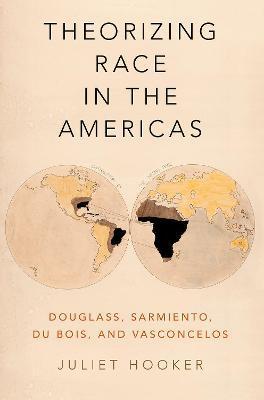Theorizing Race in the Americas: Douglass, Sarmiento, Du Bois, and Vasconcelos

Theorizing Race in the Americas: Douglass, Sarmiento, Du Bois, and Vasconcelos
In 1845 two thinkers from the American hemisphere--the Argentinean statesman Domingo Faustino Sarmiento, and the fugitive ex-slave, abolitionist leader, and orator from the United States, Frederick Douglass--both published their first works. Each would become the most famous and enduring texts in what were both prolific careers, and they ensured Sarmiento and Douglass' position as leading figures in the canon of Latin American and U.S. African-American political thought, respectively. But despite the fact that both deal directly with key political and philosophical questions in the Americas, Douglass and Sarmiento, like African-American and Latin American thought more generally, are never read alongside each other. This may be because their ideas about race differed dramatically. Sarmiento advocated the Europeanization of Latin America and espoused a virulent form of anti-indigenous racism, while Douglass opposed slavery and defended the full humanity of black persons. Still, as Juliet Hooker contends, looking at the two together allows one to chart a hemispheric intellectual geography of race that challenges political theory's preoccupation with and assumptions about East/West comparisons, and questions the use of comparison as a tool in the production of theory and philosophy.
By juxtaposing four prominent nineteenth and twentieth-century thinkers--Frederick Douglass, Domingo F. Sarmiento, W. E. B. Du Bois, and Jos Vasconcelos--her book will be the first to bring African-American and Latin American political thought into conversation. Hooker stresses that Latin American and U.S. ideas about race were not developed in isolation, but grew out of transnational intellectual exchanges across the Americas. In so doing, she shows that nineteenth and twentieth-century U.S. and Latin American thinkers each looked to political models in the "other" America to advance racial projects in their own countries. Reading these four intellectuals hemispheric thinkers, Hooker foregrounds elements of their work that have been dismissed by dominant readings, and provides a crucial platform to bridge the canons of Latin American and African-American political thought.
PRP: 461.29 Lei
Acesta este Prețul Recomandat de Producător. Prețul de vânzare al produsului este afișat mai jos.
415.16Lei
415.16Lei
461.29 LeiLivrare in 2-4 saptamani
Descrierea produsului
In 1845 two thinkers from the American hemisphere--the Argentinean statesman Domingo Faustino Sarmiento, and the fugitive ex-slave, abolitionist leader, and orator from the United States, Frederick Douglass--both published their first works. Each would become the most famous and enduring texts in what were both prolific careers, and they ensured Sarmiento and Douglass' position as leading figures in the canon of Latin American and U.S. African-American political thought, respectively. But despite the fact that both deal directly with key political and philosophical questions in the Americas, Douglass and Sarmiento, like African-American and Latin American thought more generally, are never read alongside each other. This may be because their ideas about race differed dramatically. Sarmiento advocated the Europeanization of Latin America and espoused a virulent form of anti-indigenous racism, while Douglass opposed slavery and defended the full humanity of black persons. Still, as Juliet Hooker contends, looking at the two together allows one to chart a hemispheric intellectual geography of race that challenges political theory's preoccupation with and assumptions about East/West comparisons, and questions the use of comparison as a tool in the production of theory and philosophy.
By juxtaposing four prominent nineteenth and twentieth-century thinkers--Frederick Douglass, Domingo F. Sarmiento, W. E. B. Du Bois, and Jos Vasconcelos--her book will be the first to bring African-American and Latin American political thought into conversation. Hooker stresses that Latin American and U.S. ideas about race were not developed in isolation, but grew out of transnational intellectual exchanges across the Americas. In so doing, she shows that nineteenth and twentieth-century U.S. and Latin American thinkers each looked to political models in the "other" America to advance racial projects in their own countries. Reading these four intellectuals hemispheric thinkers, Hooker foregrounds elements of their work that have been dismissed by dominant readings, and provides a crucial platform to bridge the canons of Latin American and African-American political thought.
Detaliile produsului










